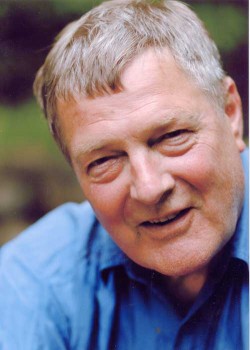Search results for "moomins/feed/www.booksfromfinland.fi/2014/10/letters-from-tove"
Translation prize
20 August 2009 | In the news
This year the Finnish Government Prize for Translation of Finnish Literature, worth €10,000, was divided between two Russian translators. Lyudmila Braude and Anna Sidorova received their awards in Helsinki on 12 August from the minister of culture and sports, Stefan Wallin.
Braude was born in Leningrad in 1927, Sidorova half a century later in Vyborg, in 1978.
Dr Lyudmila Braude specialised in the translation of German and Nordic literature. Since 1991 she has translated Finland-Swedish fiction, Tove Jansson’s works in particular; all Jansson’s Moomin books as well as a selection of her novels and stories for adults are available to Russian readers. Books by the classic children’s writer Zachris Topelius as well as Finland-Swedish poetry by classic and contemporary poets have also been among her translations. Braude has received various international prizes for her work. More…
The last melody
30 September 1995 | Archives online, Fiction, Prose
Extracts from the novel Kadotettu puutarha (‘The lost garden’, WSOY, 1995). Introduction by Riina Katajavuori
Their sojourn at the villa extended into the autumn of 1944; the schools did not go back as usual on the first of September. Repair of the university buildings progressed rapidly; the work had begun immediately after the bombing. The Doctor went to town from time to time, but nothing bound the family to it, and he returned to his desk in the attic room and to his solitary walks by the lake. His heart troubled him from time to time. It did not like these walks, did not like exertion; but he had succeeded in concealing the matter from Elisabet. After one particular attack, he had secretly seen a doctor in town, and now, instead of camphor tablets, he always had those little buttons in his pocket, the breast pocket of his waistcoat. He swallowed one from time to time on these expeditions, a pain in his wrists and his eyes staring dimly at a clump of ferns that seemed to have become hazy, or a tree-top that seemed to be falling toward him. He did not wish Elisabet to know. Not this, in Elisabet’s world, not this, in air that was suffused with grief for their dead son Leo, with well controlled and beautifully expressed emotion, with concern for the remaining boy, who was there, on the frontier, with the burdensome and universal tragedy that filled the air as light filled it in daytime. More…
How to peel an orange
30 December 2002 | Fiction, Prose
Extracts from the novel Auringon asema (‘The position of the sun’, Otava, 2002)
There are times when God rules. Then logic is burned on bonfires and left to rot in damp prisons with rats. There are times when logic rules. Then God is burned in the squares and his houses are made into schools. There are times when attempts are made to demonstrate that God and logic can live in the same place and that they are, in fact, the same thing, but those times are truly strange times. And there are times when God and logic live side by side but in different places, like adult siblings who cannot live in the same place but nevertheless get on well together. When my father and my mother loved each other, they were ruled by God, and there was no logic in it, none at all. More…
Higher goals
31 December 1987 | Archives online, Fiction, Prose
An extract from the novel Tammerkosken sillalla (‘On Tammerkoski bridge’, 1982). Introduction by Panu Rajala
I had thought there were a lot of books in the libraries in Oulu. But both those libraries were totally overshadowed when, having climbed up to the top of the Messukylä Workers’ House, I began to cast my eyes along the bookshelves in the attic. A tallish and refined-looking librarian responded when I exclaimed aloud.
‘Just under seven thousand volumes altogether. Some of them are out on loan. We’d like to have a lot more books, but getting the money to buy them is like getting water from a stone.’
‘But you’ve already got an incredible amount compared to what we have in the rural library at home… In Taivalkoski during the war all we had was two cupboardsful.’
‘You didn’t have a lot of choice there,’ agreed the librarian. More…
Vox bloody populi
25 March 2010 | Columns, Tales of a journalist
How does it sound, the people’s voice? Loud and sometimes clear perhaps, but, as columnist Jyrki Lehtola finds, more often than not shrill and puerile
According to a study carried out by Finland’s biggest newspaper, Helsingin Sanomat, 60 per cent of Finns oppose the idea of allowing more immigrants into Finland.
The chancellor of the University of Helsinki, Ilkka Niiniluoto, is concerned about freedom of speech. Immigration researchers no longer dare participate in public debate, because they find themselves the target of death threats. More…
Winner of the Susan Sontag Prize
25 December 2010 | In the news
The Susan Sontag Foundation was established in New York in 2004 in memory of the celebrated author and cultural journalist Susan Sontag (1933–2004). The Foundation grants a prize to a young American who translates from other languages into English. In 2010 the prize was awarded for the third time.
Benjamin Mier-Cruz is currently pursuing his PhD in Scandinavian Languages and Literatures at University College Berkeley, with a particular interest in Finland-Swedish modernism and German expressionist poetry. His winning translation proposal is entitled Modernist Missives of Elmer Diktonius – Letters and Poetry of Elmer Diktonius.
Elmer Diktonius (1896–1961) was a rebellious Finland-Swedish avant-garde poet and composer, who was fluent in Finnish as well as his native Swedish. His letters to a wide range of European authors and critics, written between 1919 (the year of the Finnish Civil War) and 1951, reflect the political, artistic and personal developments in Finland and Europe.
The prize ceremony took place first in Helsinki on 5 November in a seminar at the Svenska litteratursällskapet i Finland (the Society of Swedish Literature in Finland), then at Scandinavia House, New York, on 12 November.
Högtärade Maestro! Högtärade Herr Baron! [Correspondence between Axel Carpelan and Jean Sibelius,1900–1919]
17 December 2010 | Mini reviews, Reviews
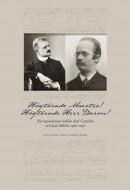 Högtärade Maestro! Högtärade Herr Baron! Korrespondensen mellan Axel Carpelan och Jean Sibelius 1900–1919
Högtärade Maestro! Högtärade Herr Baron! Korrespondensen mellan Axel Carpelan och Jean Sibelius 1900–1919
[My dear Maestro! My dear Herr Baron! Correspondence between Axel Carpelan and Jean Sibelius, 1900–1919]
Red. [Ed. by] Fabian Dahlström
Helsinki: Svenska litteratursällskapet i Finland, 2010. 549 p., ill.
ISBN 978-951-583-200-9
€40, hardback
‘For whom shall I compose now?’ wrote Finnish composer Jean Sibelius in his diary upon hearing of the death of his good friend Axel Carpelan (1858 –1919). Carpelan was a penniless baron, who considered music and his friendship with Sibelius to be the most vital aspects of his life. Using his natural-born talent and instinct, he gained acceptance as Sibelius’ trusted musical confidant, to whom the composer dedicated his second symphony. Axel came to be known by the wider public in 1986, when his great-nephew, the author Bo Carpelan, made him the protagonist of his award-winning novel entitled simply Axel. This volume, edited by Fabian Dahlström, contains the surviving Swedish-language correspondence between Sibelius and Carpelan, as well as letters to Sibelius’ wife, Aino. Carpelan wrote to her when the composer was too busy. These letters contain interesting details such as Aino Sibelius’ account of the origins of her husband’s violin concerto. The comprehensive foreword to this book sheds additional light on Carpelan’s life.
A rare bird from Fancyland
20 August 2013 | Reviews
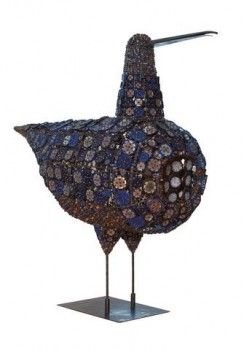
Bead-covered curlew, 1960. Height ca. 115 cm, Collection Kakkonen. Photo: Niclas Warius
Harri Kalha:
Birger Kaipiainen
Helsinki: Suomalaisen Kirjallisuuden Seura (The Finnish Literature Society), 2013. 249 p., ill.
(Summaries in Swedish and English)
ISBN 978-952-222-457-6
€46, hardback
Ceramics confectioner. Degenerate aristocrat. Ornamental criminal. These epithets can be found in Birger Kaipiainen, a new, full-length study of the ceramic artist by art historian Harri Kalha.
Throughout his artistic career Birger Kaipiainen (1915–1988) worked with forms, subjects and methods that were unfamiliar in the field of traditional ceramics, at least in mid-20th-century Finland, and made use of fantasy and ornament. As a ‘porcelain painter’ he showed little interest in the technical challenges of clay – although in his ceramic creations Kaipiainen explored three-dimensional form, montage, colour, texture and the tactile dimensions of the medium. More…
Profiles
2 October 2014 | Fiction, Prose
Rosa Liksom’s first book, in 1985, was a collection of short prose; she has also written novels, children’s books, plays, comic and picture books. Her new book, Väliaikainen (‘Temporary’, Like, 2014) – a return to her signature very short prose – features beasts, machines and men
He’s there in the living room. We’ve gotta be very quiet. I left the computer on, and the reading lamp. I’ll go in and turn them off, quietly. Or the computer at least. I can watch Emmerdale on the little tv in the kitchen. You wait here. OK, I turned off the computer but I left the lamp on so I wouldn’t wake him up. I put his nap blanket over him. He’s laying on his left side now. That’s good. Whenever he wakes up on his right side he gets awfully grumpy. Let’s go in the kitchen so we don’t disturb him. The poor guy. It’s been hours since he’s had a good sleep. You know, I think it’s the depression again. It started on Monday when he was supposed to go to his guide’s job.He didn’t taste his breakfast, even though I brought it to him in bed. I had to go to the hospital, my shift was starting, and he just laid there in the bedroom with his eyes open… I don’t know how long it’s gonna last this time. Last month he was depressed for three days. I think it’ll pass more quickly this time because he’s napping a little bit, and licking his paw now and again.
In other words
21 June 2012 | This 'n' that
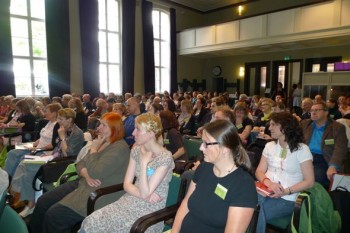
Wordworkers meet: the translators' congress in Helsinki, 11–14 June. Photo: Hannele Jyrkkä
From Finnish or Swedish into 32 languages: in mid June FILI (the Finnish Literature Exchange) held the biggest international meeting of translators of Finnish literature of all time.
The congress, entitled Kääntäjän sana/Översättarens ord (Translator’s word) was planned with one eye on the Finnish theme of the 2014 Frankfurt Book Fair.
The former Lisa Hagman School, now the House of Learning, offered the premises for workshops and lectures for 120 professional translators and almost 70 scholars of language and literature.
Participants translating from both Finnish and Finland-Swedish were offered opportunities to meet writers, listen to lectures from experts in language and literature and gain feedback from other active professional readers. More…

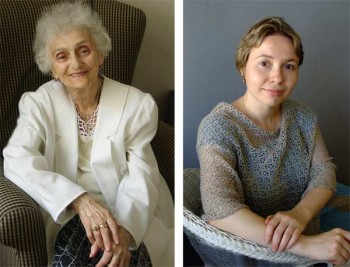
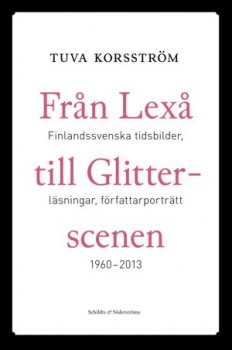 Tuva Korsström
Tuva Korsström
